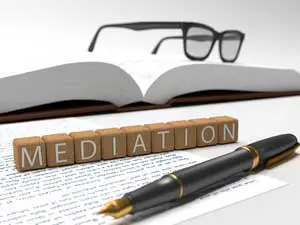During a divorce, a couple will likely face many issues that seem to be almost un-resolvable. Yet, with the help of a mediator, even the most complex divorce and child custody issues can be resolved. Some couples choose to have a mediator help resolve their differences during the divorce, while others must attend mediation due to a court order. In the state of Florida, prior to setting a court date, the couple is required to speak to a mediator. No matter how the mediation comes about, mediation is a dispute resolution technique, which can help those couples who are unable to reach a mutually acceptable agreement regarding spousal support, child custody, asset division or a myriad of other divorce details resolve those issues.
During mediation, both parties meet with an impartial, trained mediator. The mediator has no interest in seeing one spouse “win,” during mediation sessions. The mediator cannot force the parties into doing something they are uncomfortable with or don’t want to do. That being said, couples who are unable to reach acceptable resolutions with the help of a mediator may find themselves at the mercy of a judge’s mandates. The judge’s final orders regarding the divorce disputes may not make either party happy. For this reason, it is wise for both parties to work with the mediator in order to solve the disputes which are putting a halt to the divorce. There are certain myths associated with divorce mediation, including the following:/


Request a Free Consultation
- The mediator will decide my issues without my input. This is simply not true; the mediator in your divorce has no authority to compel you or your spouse to do—or not do—anything. The mediators only job is assist you and your spouse in reaching mutually acceptable resolutions to your issues.
- A mediator can “fix” all the problems associated with your divorce. Also, not true; if you or your spouse fail to honestly disclose the facts of your case, or if one party has no real interest in amicable conflict resolution, then your mediator will not be able to achieve any real results.
- Men fare better than women during mediation. This is a common misconception based on the belief that most women know less about marital finances, assets, and debts. Today’s women typically know as much about marital financial issues as men, and, in any case, the mediator is a neutral party who has no interest in one person “winning.”
- Mediation is impossible for couples who aren’t speaking to one another. While this would seem to make sense, divorce mediators have been trained in alternative dispute resolution, and are skilled in working with people who are at serious odds. Of course, you and your spouse will have to speak to one another at some point in order for the mediation to be successful. The belief that mediation can’t help couples who are unable to get along is a common misperception. In fact, while mediation may not be right for every couple, it can absolutely help those who are having difficulty communicating with one another.
- Complex divorce cases cannot be handled through mediation. Any divorce can be handled through mediation, even those involving complex financial issues.
- If I go to mediation, I will end up with less than I deserve. The state of Florida is an equitable distribution state which means assets, property and debt are divided fairly and equitably. Regardless of whether your case is mediated or litigated, the division of property will be equitable. It is important to note that a mediator works with the information provided, therefore if one party is withholding important financial information, the agreement the mediator suggests may not be fair or equitable. The divorce attorney is crucial in this instance; he or she will assist in the preparation and presentation of all necessary information.
- Mediation cannot resolve issues related to child custody. In fact, couples who engage in mediation are more likely to have a favorable outcome, including the outcome related to child custody issues. When a couple is able to present a parenting plan both are satisfied with, the entire family benefits, and a skilled mediator can assist in the development of such a parenting plan.
- Mediation is always the best course of action. In fact, there are certain times when mediation is not appropriate. If there has been physical or emotional abuse in the marriage, then mediation is unlikely to be successful. In the same vein, if one spouse has a drug or alcohol addiction, mediation will probably not work. Finally, if one spouse is hiding assets from the other, mediation is not the best way to go. The mediator has no authority to compel a spouse to divulge financial information, therefore a judge would have to do so.
Advantages to Mediation
There are definite advantages to divorce mediation, and, in many cases, having a neutral third party question the position taken by one spouse or another could result in a re-thinking of the position. Some other advantages to divorce mediation include:
- Divorce mediation can save you some money. Because you and your spouse are paying one professional whose only job is to assist you in reaching a resolution to your conflict, you may spend less money than when you pay to have motions sent back and forth, accompanied by court appearances.
- Divorce mediation allows you to control the discussions as well as the outcome; you and your spouse will choose the topics you need help with, and the two of you—rather than the judge—have the final say over the terms of the agreement.
- During divorce mediation you may receive more personal attention, as you are allowed to speak and be heard during divorce mediation. Family court judges tend to overworked and understaffed, and simply don’t have the time to get to know you, your spouse, your family and your situation.
- Divorce mediation can offer your children some measure of protection from conflict as the mediator can help educate the spouses in a more neutral manner, keeping the focus on the children’s needs.
- Divorce mediation can lead to greater post-divorce stability; as opposed to the adversarial nature of the court litigation system, mediation can actually improve your understanding of your spouse’s position and vice-versa, facilitating honest communication.
- Divorce mediation generally allows a faster resolution; you and your spouse will set the timeframe for resolving your issues without having to wait months for the next court date. In many instances you may be able to resolve your conflict areas within a few sessions.
- Divorce mediation offers you complete confidentiality; all communications, documents and work notes accumulated during your mediation are privileged and confidential. While you are forced to argue your divorce case in a public courtroom with a judge, attorneys, officers and court employees in attendance during a contentious divorce, your mediation is much more private and personal.
- Divorce mediation offers greater flexibility with scheduling. In our incredibly busy world, mediators may agree to meet in the evening or on weekends and are more able to work around your hectic schedule as opposed to a court with overflowing dockets and rigid operating hours.
Are There Any Disadvantages to Divorce Mediation?
Although the advantages of Sarasota divorce mediation often outweigh any disadvantages, there are a few potential drawbacks associated with divorce mediation such as:
- Divorce mediators don’t have the authority of a judge behind them, meaning they have no power to make legal, binding demands on either party. This means that the success of your divorce mediation is entirely dependent on the cooperation of you and your spouse.
- A divorce mediator may not be able to fully advise you of the legal aspects regarding the decisions you are making—you could end up reaching an agreement which causes you to lose important rights.
- A divorce mediator cannot compel either you or your spouse to do anything—such as reveal true income and assets. This means that if one party is concealing issues during mediation, there will likely be no equitable resolution available.
- In some instances one spouse may feel the mediator favors the other spouse; when this happens it is unlikely a resolution will be reached.
Mediation Agreements Must Be Reviewed By an Attorney

Even if your mediation seems to go smoothly and you and your spouse are able to reach a mediated agreement, this agreement must be reviewed by your Ayo and Iken attorney in order to ensure the decisions reached are legal and are in your best interests. In many cases those who are divorcing are unaware of the different ways they can choose to settle their differences, other than litigation. When couples don’t know there may be better ways to come to an agreement, or when they have misperceptions regarding divorce mediation, they are prevented from availing themselves of the many benefits associated with divorce mediation.
The Financial Aspect of Mediation
In certain instances, mediation can save couples a considerable amount of money. Florida statutes allow a court to refer spouses to mediation regarding such issues as parental responsibility, access to the children, visitation, child support, spousal support or division of assets. The costs of such mediation, including filing fees, costs of mediation, recording fees and service of process fees will be levied against the non-prevailing parent if the court determines that parent is able to pay such fees. In the state of Florida, the cost of mediation is based on state statutes, and are provided at a reduced rate for couples with a combined income of less than $100,000.
Couples must file a Financial Affidavit with their case in order to establish the fees associated with divorce mediation. Once an agreement is reached between spouses, the mediator will prepare a consent order which will then go to the respective attorneys for approval. If both spouses’ attorneys sign off on the consent order, it will then be reviewed by a family court judge. Once the judge approves the order, it will be entered into the record and may be enforced like any other court order.
Choosing a Mediator
If spouses have agreed to speak to a divorce mediator, it is important they find a mediator with the proper credentials as well as one who is knowledgeable regarding the governing divorce laws of the state of Florida. In some cases, a Florida divorce mediator may also be a Florida attorney. Prospective mediators should be interviewed by the couple, in order to ensure both parties are comfortable with the chosen mediator. Since the couple will be discussing some of the most intimate details of their family life, a mediator they are comfortable with is crucial.
In the state of Florida a mediator must be certified. In order to obtain mediator certification, a person must be at least 21 years of age and “of good moral character.” The person seeking mediator certification must also have a specific number of points for certification. Those points are based on such things as a high school diploma or GED, completion of a Florida Supreme Court certified county court mediation training program, education, mentorship and/or a bachelor’s degree or graduate degree.
Will Mediation Work For Everyone?
Mediation is not for everyone; following being the victim of a violent crime or being diagnosed with a terminal illness, divorce ranks as one of the most traumatic experiences in a person’s life. In some instances, a person may be caught totally unaware when they are served with divorce papers and may not be willing to sit in a room with their spouse and a mediator. In other instances, when the marriage has been extremely contentious or there has been domestic violence involved, mediation simply may not be the right avenue. If one or both parties are not able to control their anger associated with the divorce, it would probably be wise for each party to retain separate legal counsel and go from there.
